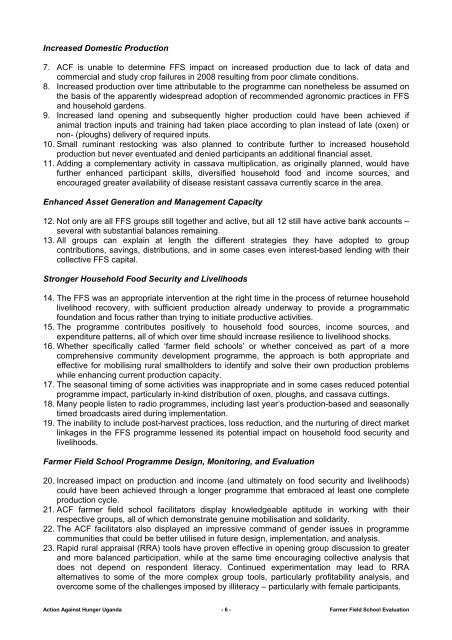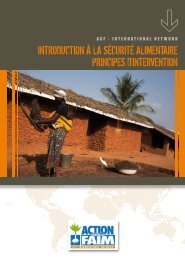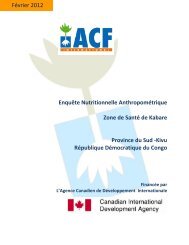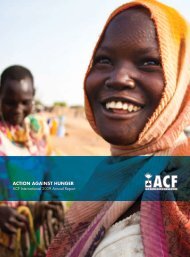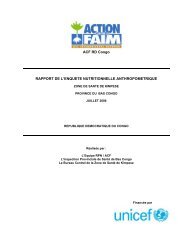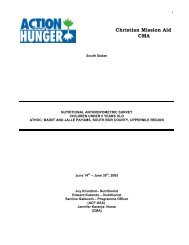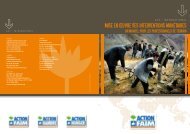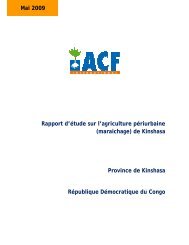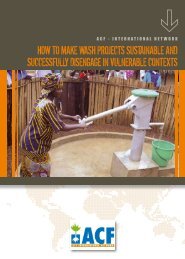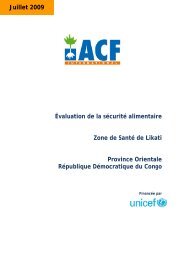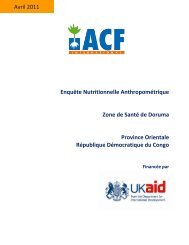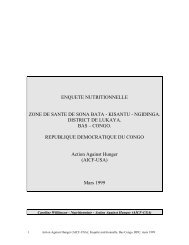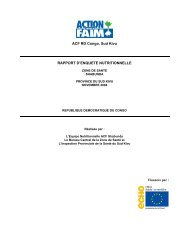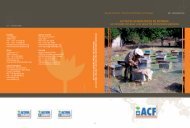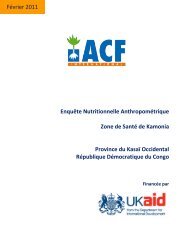Participatory Evaluation of our 2008 - Action Against Hunger
Participatory Evaluation of our 2008 - Action Against Hunger
Participatory Evaluation of our 2008 - Action Against Hunger
Create successful ePaper yourself
Turn your PDF publications into a flip-book with our unique Google optimized e-Paper software.
Increased Domestic Production<br />
7. ACF is unable to determine FFS impact on increased production due to lack <strong>of</strong> data and<br />
commercial and study crop failures in <strong>2008</strong> resulting from poor climate conditions.<br />
8. Increased production over time attributable to the programme can nonetheless be assumed on<br />
the basis <strong>of</strong> the apparently widespread adoption <strong>of</strong> recommended agronomic practices in FFS<br />
and household gardens.<br />
9. Increased land opening and subsequently higher production could have been achieved if<br />
animal traction inputs and training had taken place according to plan instead <strong>of</strong> late (oxen) or<br />
non- (ploughs) delivery <strong>of</strong> required inputs.<br />
10. Small ruminant restocking was also planned to contribute further to increased household<br />
production but never eventuated and denied participants an additional financial asset.<br />
11. Adding a complementary activity in cassava multiplication, as originally planned, would have<br />
further enhanced participant skills, diversified household food and income s<strong>our</strong>ces, and<br />
enc<strong>our</strong>aged greater availability <strong>of</strong> disease resistant cassava currently scarce in the area.<br />
Enhanced Asset Generation and Management Capacity<br />
12. Not only are all FFS groups still together and active, but all 12 still have active bank accounts –<br />
several with substantial balances remaining.<br />
13. All groups can explain at length the different strategies they have adopted to group<br />
contributions, savings, distributions, and in some cases even interest-based lending with their<br />
collective FFS capital.<br />
Stronger Household Food Security and Livelihoods<br />
14. The FFS was an appropriate intervention at the right time in the process <strong>of</strong> returnee household<br />
livelihood recovery, with sufficient production already underway to provide a programmatic<br />
foundation and focus rather than trying to initiate productive activities.<br />
15. The programme contributes positively to household food s<strong>our</strong>ces, income s<strong>our</strong>ces, and<br />
expenditure patterns, all <strong>of</strong> which over time should increase resilience to livelihood shocks.<br />
16. Whether specifically called ‘farmer field schools’ or whether conceived as part <strong>of</strong> a more<br />
comprehensive community development programme, the approach is both appropriate and<br />
effective for mobilising rural smallholders to identify and solve their own production problems<br />
while enhancing current production capacity.<br />
17. The seasonal timing <strong>of</strong> some activities was inappropriate and in some cases reduced potential<br />
programme impact, particularly in-kind distribution <strong>of</strong> oxen, ploughs, and cassava cuttings.<br />
18. Many people listen to radio programmes, including last year’s production-based and seasonally<br />
timed broadcasts aired during implementation.<br />
19. The inability to include post-harvest practices, loss reduction, and the nurturing <strong>of</strong> direct market<br />
linkages in the FFS programme lessened its potential impact on household food security and<br />
livelihoods.<br />
Farmer Field School Programme Design, Monitoring, and <strong>Evaluation</strong><br />
20. Increased impact on production and income (and ultimately on food security and livelihoods)<br />
could have been achieved through a longer programme that embraced at least one complete<br />
production cycle.<br />
21. ACF farmer field school facilitators display knowledgeable aptitude in working with their<br />
respective groups, all <strong>of</strong> which demonstrate genuine mobilisation and solidarity.<br />
22. The ACF facilitators also displayed an impressive command <strong>of</strong> gender issues in programme<br />
communities that could be better utilised in future design, implementation, and analysis.<br />
23. Rapid rural appraisal (RRA) tools have proven effective in opening group discussion to greater<br />
and more balanced participation, while at the same time enc<strong>our</strong>aging collective analysis that<br />
does not depend on respondent literacy. Continued experimentation may lead to RRA<br />
alternatives to some <strong>of</strong> the more complex group tools, particularly pr<strong>of</strong>itability analysis, and<br />
overcome some <strong>of</strong> the challenges imposed by illiteracy – particularly with female participants.<br />
<strong>Action</strong> <strong>Against</strong> <strong>Hunger</strong> Uganda - 6 - Farmer Field School <strong>Evaluation</strong>


